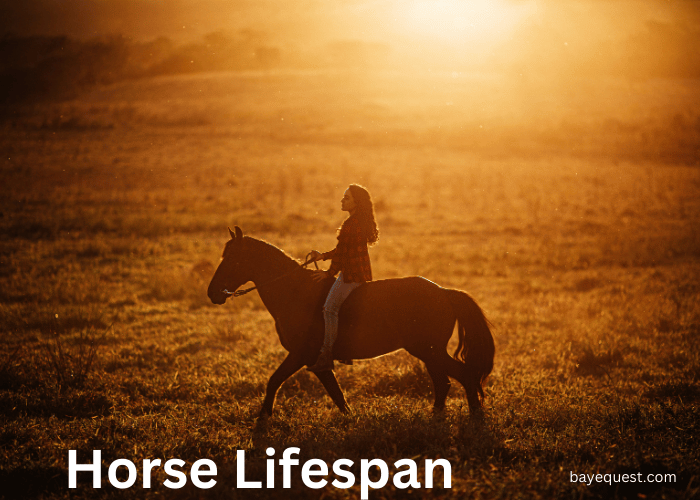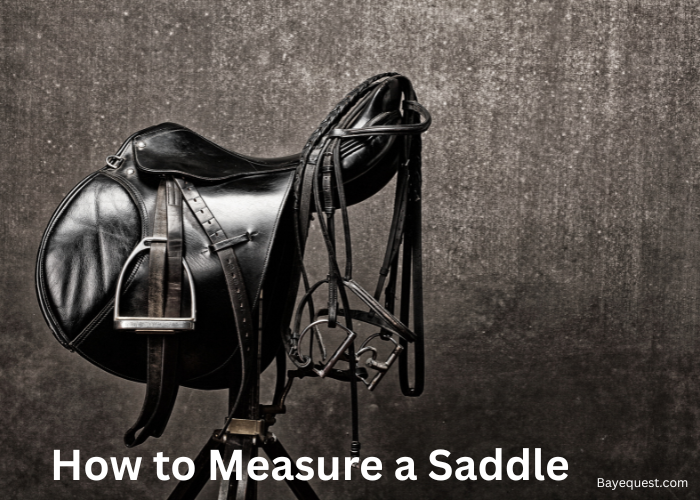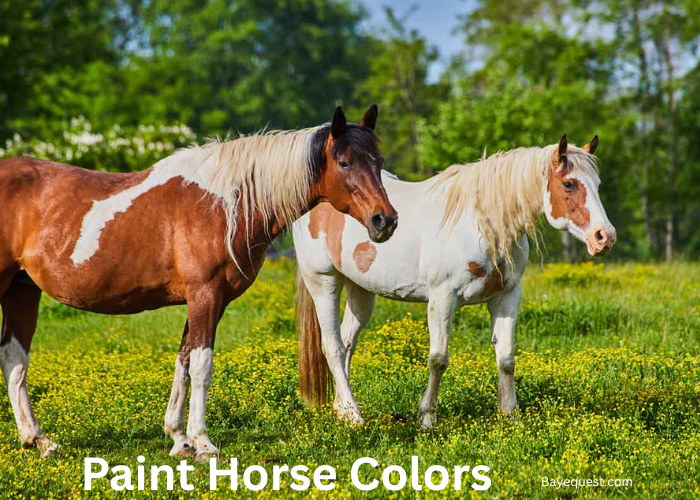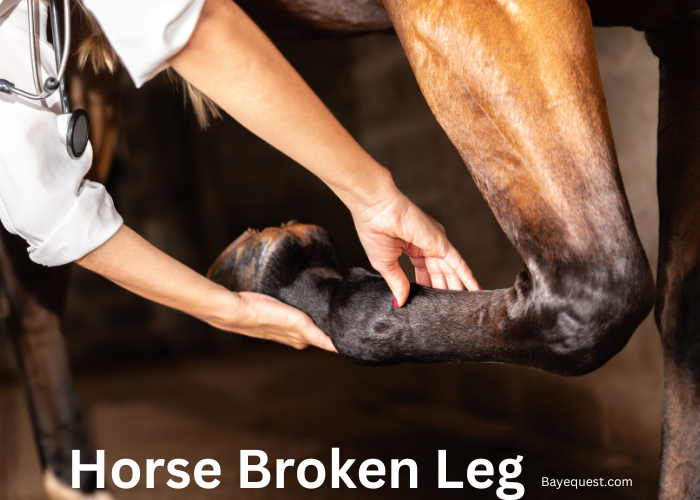Horses are loyal friends and trusted companions. But how long do they stay by our side?
Well, a horse’s journey through life is shaped by its breed, care, and a bit of luck. Some live decades, while others bow out a little sooner.
Let’s explore what influences the life expectancy of a horse and how we can help them live their best life.
What is the Average Life Expectancy of a Horse? Key Takeaway
The average horse lifespan is 25 to 30 years, but it varies by breed, care, and environment. Some horses, like Arabians, can live up to 35-40 years, while ponies often live longer than larger breeds. Proper nutrition, regular veterinary care, and good living conditions can extend a horse’s lifespan.
How Long Do Horses Live?
The answer isn’t just a number. It’s influenced by the care they receive, the work they do, and where they live.
Their lifespans can vary greatly from the well-loved backyard pony to the finely tuned racehorse.
Some horses might live into their 30s, enjoying many years of retirement, while others have shorter lives due to the demands placed upon them.
Related read: How Long Do Donkeys Live?
Stages of Maturity in Horses
Understanding the stages of maturity in horses gives us insight into their development and care needs. Here’s a breakdown of these key stages:
Newborn. The newborn stage covers the first few months of a horse’s life. During this time, foals depend on their mothers for nutrition and protection. They are quick to stand and nurse shortly after birth, and they begin to show curiosity and playfulness within a few weeks.
Weanling. At around six months, foals enter the weanling stage, when they are separated from their mothers. This is a critical period for socialization and early training. Weanlings start learning how to interact with humans and other horses. They also begin basic training like leading and halter breaking.
Youth. This stage, also known as the yearling and juvenile stage, is 1 to 3 years old. During this period, horses continue their training and education. They are not yet fully grown, so you must manage their physical activities to avoid stress on their developing bodies.
Adult. Horses are considered adults from about 4 to 15 years old, though this can vary depending on the breed. Adult horses reach their peak physical condition and are capable of performing the full range of activities for which they are trained.
Geriatric. As horses age beyond 15 years, they enter the geriatric stage. The onset of this stage can vary depending on the horse’s overall health, breed, and life conditions. Geriatric horses may show signs of aging like reduced stamina, weight loss, or dental problems.
Factors that Influence the Average Lifespan of Horses
Curious why some horses live longer than others? Dive in to discover the key factors that shape a horse’s lifespan.
Breed
Breed plays a big role in how long a horse might live. Different breeds have different lifespans.
For instance, smaller breeds like Arabians and Ponies often live longer than larger breeds like Draft horses. This difference is partly because larger animals can have more strain on their bodies, leading to earlier health issues.
Some breeds have been bred for traits that can impact their health. For example, Thoroughbreds are known for racing. Their intense physical demands can lead to injuries that might shorten their lives.
Conversely, breeds like the Arabian are known for endurance and hardiness, which contribute to their longer lifespans.
In short, the breed can tell us a lot about a horse’s natural lifespan. It’s key to predicting how long they might be with us.
Diet
Diet is crucial for a horse’s health and lifespan. What a horse eats affects its energy, health, and how long it might live. A balanced diet helps prevent diseases and keeps a horse feeling strong.
Horses need a mix of forage, like hay or grass, and concentrates, such as grains. The right balance keeps their digestive systems healthy.
A horse eating too much grain and not enough forage can lead to issues like colic or laminitis. These conditions can seriously affect a horse’s health and lifespan.
Supplements can also play a part. They help fill any gaps in nutrition, especially for older horses. Things like vitamins and minerals support their overall health.
In simple terms, a good diet keeps a horse healthy and can help it live a longer life. It’s about more than just filling the feed bucket; it’s about meeting all their nutritional needs.
Exercise
Exercise is key to a horse’s longevity. It keeps their muscles strong and their joints flexible. Regular activity helps maintain a healthy weight and boosts overall health. This can lead to a longer and happier life for horses.
Too little exercise can lead to problems. Horses that don’t move enough may develop issues like obesity or digestive problems. These can shorten their lifespan.
On the flip side, too much exercise, especially if not managed well, can cause injuries. These injuries can also reduce a horse’s lifespan.
It’s all about balance. The right amount of exercise depends on the horse’s age, breed, and overall health. Young horses benefit from gentle exercise to build their strength and stamina.
Adult horses need regular, varied activities to stay in peak condition. Older horses might need lighter exercise to keep them mobile without strain.
In essence, regular, well-managed exercise is crucial. It keeps horses healthy for longer, contributing significantly to their lifespan.
Hoof care
Hoof care is important for a horse’s health and longevity. Horses’ hooves are like their foundation. If they’re not cared for properly, many problems can affect the horse’s overall health and lifespan.
Regular trimming and shoeing are essential. These prevent issues like overgrowth and uneven wear, which can cause pain and lead to abnormal walking patterns.
Such issues can strain the horse’s legs and lead to more serious joint and muscle problems over time.
Good hoof care also includes protection from infections like thrush and white line diseases. If left untreated, these conditions can deteriorate hooves, impacting the horse’s ability to move and exercise.
Environmental factors
Environmental factors play a significant role in determining a horse’s lifespan. The conditions in which a horse lives can greatly influence its health and longevity include:
Climate and weather. Horses need appropriate shelter from extreme weather conditions. Whether it’s winter or summer, you need to provide adequate protection to prevent stress and illness. Horses that are exposed to too much moisture can develop hoof problems, while those in excessive heat may suffer from dehydration or heatstroke.
Living space. The amount of space a horse has to roam, and exercise is also crucial. Horses confined to small, cramped areas are more prone to physical and mental health issues. Adequate space allows for necessary physical activity and reduces stress.
Cleanliness. The cleanliness of a horse’s environment affects its health directly. Stalls and paddocks need regular cleaning to prevent waste build-up and control pests. A clean living area helps prevent diseases and promotes a healthier life.
Quality of pasture. The quality of the pasture where a horse grazes impacts its diet and nutrition. Pastures that are well-managed and free of toxins and pollutants provide better nutrition and reduce the risk of ingesting harmful substances.
Social environment. Horses are social animals, and their interactions with other horses can influence their stress levels and happiness. A positive social environment with suitable companions can improve a horse’s mental health.
Dental care
Dental care is key to a horse’s health and longevity. Horses’ teeth grow and change over their lives, often causing dental issues.
These issues can make it hard for horses to eat well, leading to nutritional problems. Regular dental check-ups are crucial.
Let a qualified dentist or vet check your horse’s teeth at least once a year. They often perform “floating,” which smooths out sharp edges on the teeth. This helps the horse eat more comfortably.
Good dental care ensures proper nutrition, prevents painful conditions, and avoids secondary health issues like colic. Simply put, taking good care of a horse’s teeth can greatly extend its life.
Veterinary care
Veterinary care is critical in extending a horse’s lifespan. Regular visits to a vet can catch health issues before they become serious. Early detection is key to effectively treating many equine diseases.
Vaccinations are an essential part of veterinary care. They protect horses from infectious diseases that can be life-threatening.
Deworming is also crucial. It prevents parasitic infections that can affect a horse’s health and performance.
Regular check-ups include examinations of the heart, lungs, and overall condition. These check-ups help ensure the horse is healthy or provide early treatment if not.
Veterinary care becomes even more important for older horses. As they age, they are more likely to develop health issues that require careful management.
Read also: Vaccines Horses Need.
Workload
The workload a horse carries has a direct impact on its lifespan. Overworking a horse, especially young, can lead to early wear and tear on joints and muscles, potentially shortening its life.
You must adjust the workload according to the horse’s age, breed, and physical condition. Young horses, whose bodies are still developing, should not be subjected to heavy work.
As horses age, while their capacity for work might increase, you also need to monitor their health and adjust tasks to avoid overexertion.
Adequate rest and recovery are essential. Properly managing a horse’s workload helps prevent injuries and stress, contributing to a healthier, longer life.
Average Lifespan of Common Horse Breeds
This table provides a look at the expected lifespans for different horse breeds. These vary depending on factors like breed characteristics and conditions of care.
| Breed | Expected Lifespan |
| American Cream Draft | 20-25 years |
| American Paint Horse | 30+ years |
| American Quarter Horse | 20-30+ years |
| American Saddlebred | 30-35 years |
| American Standardbred | 30-35+ years |
| Andalusian | 20-25 years |
| Appaloosa | 26-30+ years |
| Arabian | 18-30 years |
| Ardennes | 25-30 years |
| Belgian Draft | 18-30 years |
| Cleveland Bay | 40+ years |
| Clydesdale | 20-25 years |
| Connemara | 20-25 years |
| Criollo | 20-35 years |
| Dutch Warmblood | 24-29 years |
| Exmoor Pony | 30+ years |
| Falabella | 16-20 years |
| Friesian (Belgian Black) | 16-18 years |
| Gypsy Vanner (Irish Cob) | 25-30+ years |
| Hackney | 25-30 years |
| Haflinger | 30-35 years |
| Hanoverian | 25-30 years |
| Highland | 25-30 years |
| Icelandic | 25-30 years |
| Irish Sport Horse | 25-30 years |
| Lipizzaner | 20-30 years |
| Morgan | 25-30 years |
| Mustang | 15-25 years |
| Norwegian Fjord | 25-35 years |
| Oldenburg | 25-28 years |
| Orlov Trotter | 25-30 years |
| Paso Fino | 28-33 years |
| Percheron | 25-35 years |
| Shetland Pony | 30-40 years |
| Shire | 35-45 years |
| Suffolk | 25-30 years |
| Tennessee Walker | 25-30+ years |
| Thoroughbred | 30-35+ years |
| Trakehner | 30-35+ years |
| Walkaloosa | 30-35+ years |
| Welsh Cob | 35+ years |
| Welsh Pony | 35+ years |
How to Improve the Lifespan of Your Horse
Focus on comprehensive care and management to improve your horse’s lifespan. Schedule regular vet visits to detect and treat health issues early and keep vaccinations and deworming current.
Provide a balanced diet tailored to your horse’s age and activity level, emphasizing quality forage and clean water. Regular, suitable exercise is crucial to maintain fitness without causing stress or injury.
Also, do not overlook hoof and dental care, as these are essential for overall health. Manage stress by maintaining a stable routine and providing a safe, clean environment with adequate shelter and companionship.
These steps will help your horse live a longer, healthier life.
Interesting read: What Happened to Hickstead?
What are the Signs of Ageing in Horses?
Signs of aging in horses can vary, but some common indicators include:
Grey hair. Like humans, horses can develop grey or white hairs as they age, particularly around the eyes and muzzle.
Weight loss. Aging horses may have difficulty maintaining weight due to dental problems or reduced digestive efficiency.
Dull coat. Older horses may develop a dull or rough coat due to changes in skin and hair quality.
Loss of muscle mass. Muscle loss, particularly along the topline and hindquarters, can be a sign of aging and reduced exercise tolerance.
Decreased mobility. Arthritis and joint stiffness can make movement more challenging for older horses.
Dental issues. Worn or missing teeth can affect a horse’s ability to chew properly, leading to weight loss or difficulty eating.
Decreased energy. Older horses may have reduced energy levels and stamina, showing less enthusiasm for work or exercise.
Behavioral changes. Changes in temperament, such as increased irritability or decreased social interaction, can indicate discomfort or pain associated with aging.
Sagging skin. As horses age, their skin may lose elasticity and sag, particularly around the face and neck.
Eye changes. Cloudiness or opacity in the eyes and a sunken appearance can be signs of aging-related eye conditions like cataracts or reduced tear production.
How to Care for a Senior Horse
Caring for a senior horse means paying close attention to their needs. Keep their diet balanced and easy to chew.
Regular vet check-ups are crucial to catch any health issues early. Ensure they have a comfy place to rest and plenty of space to move around.
Check their teeth and hooves often. Keep their environment clean and free of hazards. And most importantly, give them lots of love and attention.
Older horses may need extra care but can enjoy a happy and comfortable life with the right support.
Read also: Best Feeds for Senior Horses.
Oldest Horses Ever Recorded
- Old Billy: Lived to be 62 years old.
- Mingun Sayadaw: Lived to be 56 years old.
- Sugar Puff: Lived to be 56 years old.
- Magic: Lived to be 54 years old (Born in 1948, died in 2002).
- Shayne: Lived to be 51 years old (Born in 1960, died in 2011).
- Prospector: Lived to be 51 years old (Born in 1947, died in 1998).
- Taffy: Lived to be 50 years old.
- Sham: Lived to be 50 years old (Born in 1959, died in 2009).
- Red: Lived to be 50 years old.
- Bramble: Lived to be 48 years old (Born in 1966, died in 2014).
Common Diseases that Affect a Horse’s Lifespan
Here are some common diseases that can affect a horse’s lifespan:
Colic. Colic is abdominal pain in horses that various factors can cause. These include digestive issues, intestinal blockages, or gas buildup. Severe cases of colic can be life-threatening if not promptly treated.
Laminitis. Laminitis is a painful inflammation of the sensitive laminae within a horse’s hoof. It can be triggered by factors such as overeating, obesity, or metabolic disorders.
Equine Infectious Anemia (EIA). Also known as swamp fever, EIA is a viral disease transmitted by blood-feeding insects. It can cause fever, anemia, and weight loss in horses. While some horses may carry the virus without showing symptoms, EIA can be fatal.
Equine Influenza. Equine influenza is a highly contagious respiratory infection caused by influenza viruses. It can spread through a herd and cause symptoms such as coughing, nasal discharge, and fever.
Equine Protozoal Myeloencephalitis. EPM is a neurological disease caused by a protozoan parasite that affects the central nervous system of horses. Symptoms can vary widely, including weakness, ataxia, and muscle atrophy.
Equine Recurrent Uveitis. Also known as moon blindness, ERU is an inflammatory eye condition that can cause recurrent episodes of pain, vision loss, and, ultimately, blindness in horses. While ERU is not life-threatening, it can impact a horse’s quality of life and may require long-term management.
Strangles. Strangles is a highly contagious bacterial infection caused by Streptococcus equi. It affects the respiratory system and can cause symptoms such as fever, nasal discharge, and swelling of the lymph nodes. Treating strangles in horses involves a combination of supportive care and, sometimes, medical intervention
When Do Horses Stop Growing?
Horses stop growing when they reach maturity, which is usually around four to five years old. At this point, they’ve reached their full size and skeletal development.
However, some larger breeds may continue to fill out and develop muscle mass until they’re around six or seven years old.
Proper nutrition and care during this growth period are essential to ensure healthy development and support overall well-being.
FAQs
How can you tell a horse’s age?
You can tell a horse’s age by examining various physical indicators, such as the condition of its teeth, the prominence of certain facial features, and the overall appearance of its body.
Which horse breed has the longest lifespan?
There isn’t a specific horse breed that universally has the longest lifespan. Individual horses’ lifespans can vary based on factors like genetics, care, and environment. However, smaller horse breeds like ponies and light horse breeds like Arabians and Morgans have a longer lifespan.
Do horses live longer in warm climates?
No. Horses don’t live longer in warm climates. Their lifespan is more influenced by factors like genetics, diet, and care than by climate alone. However, certain climate-related factors can affect a horse’s health and well-being.
Conclusion: Horse Lifespan
And there you have it, folks. We’ve galloped through the ins and outs of horse lifespan.
From the tender days to the seasoned old age, we’ve explored the factors that shape a horse’s longevity. So, as we bid farewell to this adventure, let’s remember to cherish every moment with our equine companions.
After all, in the grand tapestry of life, there’s nothing quite like the bond between a human and their horse. Until next time, happy trails, and may your horses live long and prosper.








